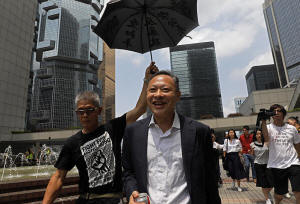45 pro-democracy activists face sentencing in Hong Kong. Here's who some
of them are
 Send a link to a friend
Send a link to a friend
 [November 18, 2024]
By KANIS LEUNG [November 18, 2024]
By KANIS LEUNG
HONG KONG (AP) — Dozens of prominent Hong Kong pro-democracy activists
are scheduled to be sentenced Tuesday in the largest case under a
national security law that critics say crushed political activism in the
semi-autonomous Chinese city.
The convictions of the 45 activists under the Beijing-imposed law are
widely seen as part of a crackdown by China that destroyed hopes for a
more democratic Hong Kong. They face sentences of up to life
imprisonment.
The activists were among 47 people charged with conspiracy to commit
subversion in 2021 for their involvement in an unofficial primary
election to pick opposition candidates. They were accused of agreeing to
veto government-proposed budgets indiscriminately after securing a
legislative majority to force a dissolution of the legislature and then
the ouster of the city's leader.
Three government-approved judges ruled that the plan to achieve
political change through the unofficial primary in 2020 would have
undermined the government’s authority and created a constitutional
crisis.
Thirty-one of the activists pleaded guilty and 14 others were found
guilty in May following a trial. Two were acquitted. Those who entered
guilty pleas have a better chance of shorter prison terms.
Some of the convicted activists have sought lesser sentences by
expressing remorse and apologizing. Others have remained defiant.
Here are profiles of some of the leading activists.

Benny Tai
Riding on a wave of anti-government protests in 2019, Benny Tai, a
former law professor at the University of Hong Kong, co-organized the
primary election that drew 610,000 voters — over 13% of the city’s
registered electorate. The primary was aimed at selecting pro-democracy
candidates who would then run in the official election.
The judges said Tai stated that acquiring a legislative majority was a
“constitutional weapon of mass destruction" that would allow the
pro-democracy camp to veto government budgets. Under the city’s Basic
Law, or mini-constitution, the city leader can dissolve the legislature
if a budget cannot be passed. But the leader must step down if the
budget is again blocked by the next legislature.
The judges said Tai aimed to “undermine, destroy or overthrow the
existing political system and structure” of Hong Kong.
Tai pleaded guilty to the charge. In seeking a shorter sentence, his
lawyer said Tai always supported non-violence and believed his actions
were legal.
Tai was not always viewed as a threat by authorities. He was a member of
a consultative committee that helped collect views on the drafting of
the Basic Law before the former British colony returned to Chinese rule
in 1997.
In 2001, the government awarded him a medal of honor for promoting civic
education, though it was withdrawn in 2022.
Tai is perhaps best known as a co-founder of the city’s 2014 Occupy
Movement, during which demonstrators occupied streets and brought
traffic to a standstill in some areas for nearly 80 days, demanding
direct elections for the city’s leader.
[to top of second column]
|

Occupy Central leader Benny Tai, center, is accompanied by a
supporter who raises an umbrella as he leaves high court in Hong
Kong, on Aug. 15, 2019. (AP Photo/Vincent Yu, File)

Joshua Wong
Joshua Wong rose to fame in Hong Kong in 2012 as a high school
student leading protests against the introduction of national
education in the city’s schools. Two years later, he became world
famous as a leader of the Occupy Movement.
In 2016, Wong co-founded a political party named “Demosisto” with
fellow young activists Nathan Law and Agnes Chow. In the 2019
pro-democracy movement, Wong helped seek overseas support for the
protests. His activism led Beijing to label him an advocate of Hong
Kong's independence who “begged for interference” by foreign forces.
Demosisto disbanded when Beijing imposed the security law in 2020.
Wong won in the primary election, but the government postponed the
official election, citing public health risks during the COVID-19
pandemic.
Wong has pleaded guilty and asked for a lesser sentence. His lawyer
said he hoped “he could part with his history and would be able to
reform himself” after completing it.
Wu Chi-wai
Wu Chi-wai is the former chair of Hong Kong's biggest pro-democracy
party, the Democratic Party, which some activists saw as too
moderate. In 2006, the government awarded Wu a medal of honor for
community service.
Wu entered a guilty plea, with his lawyer saying he has been in
public service for over 30 years and that he and his party did not
seek indiscriminate vetoing of budgets. Three former government
officials wrote letters seeking a reduced sentence for him.
Wu's parents passed away during his detention and he could only
briefly attend their funerals.
Gordon Ng
Gordon Ng, a dual citizen of Australia and Hong Kong, was initially
named an organizer of the primary by prosecutors, an accusation Ng
denied. He pleaded not guilty.
The judges acknowledged in their verdict that Ng did not organize
the plan and was not a candidate. However, they pointed to his
campaign urging voters to support primary winners through social
media posts and a front-page advertisement in the now-shuttered
pro-democracy Apple Daily newspaper, founded by Jimmy Lai.
In seeking a lesser sentence, Ng said his support for the primary
was linked to his belief that it could address the differences
within the pro-democracy camp, which had long been plagued by
infighting. He said he never asked candidates to promise to veto
budgets.
All contents © copyright 2024 Associated Press. All rights reserved
 |